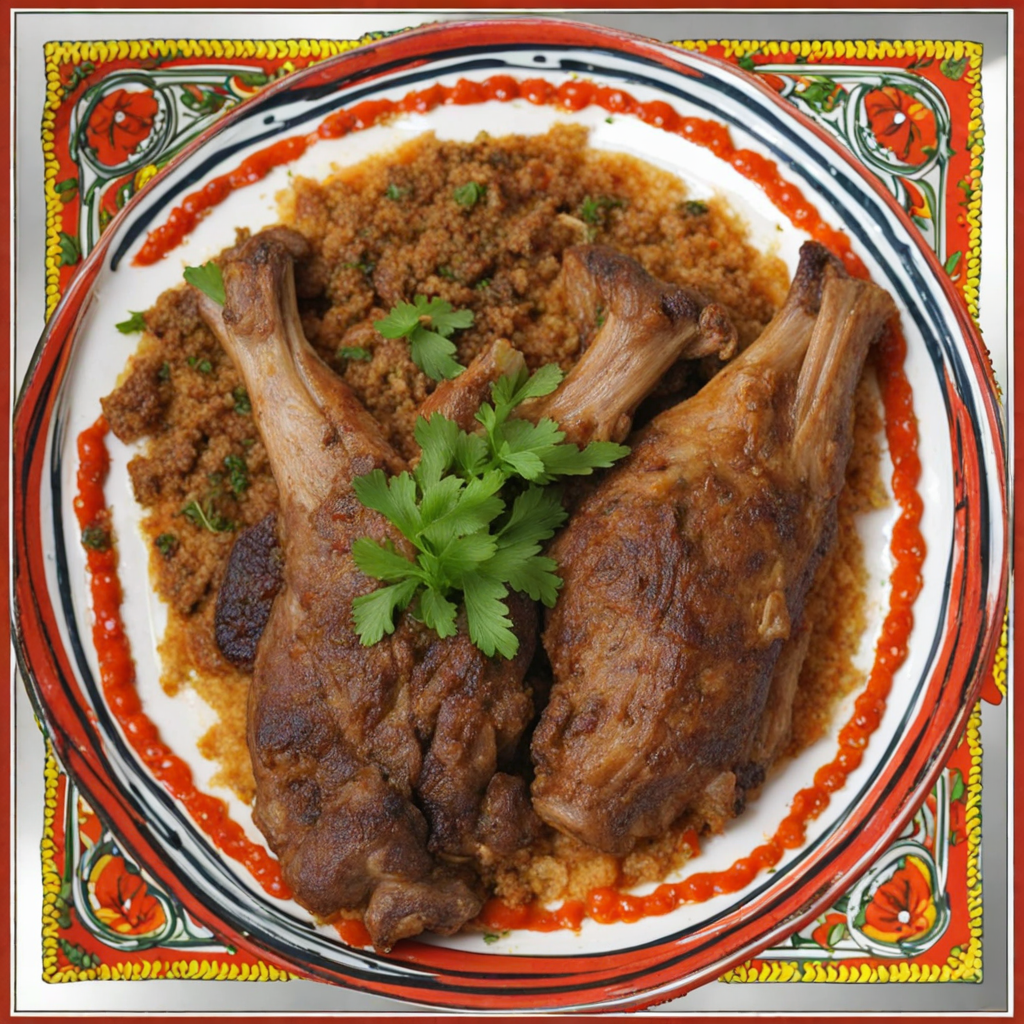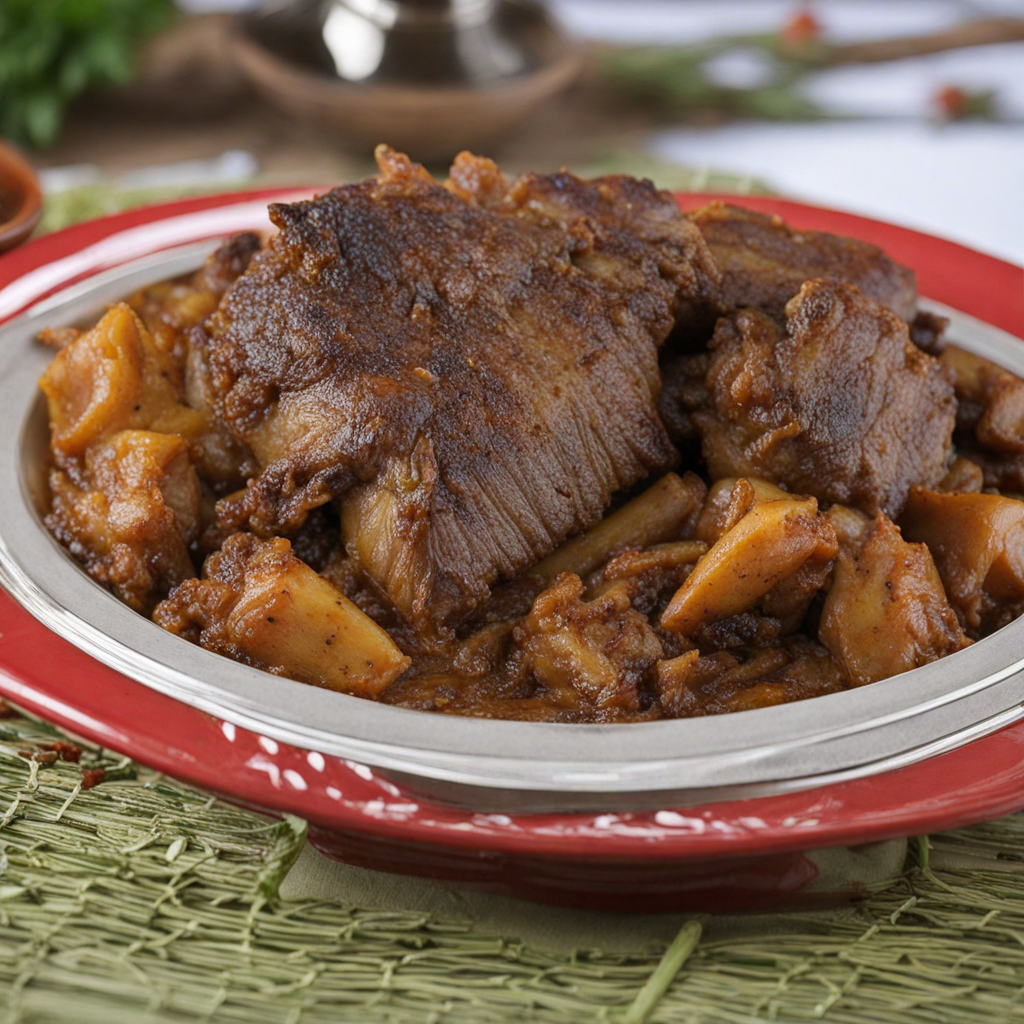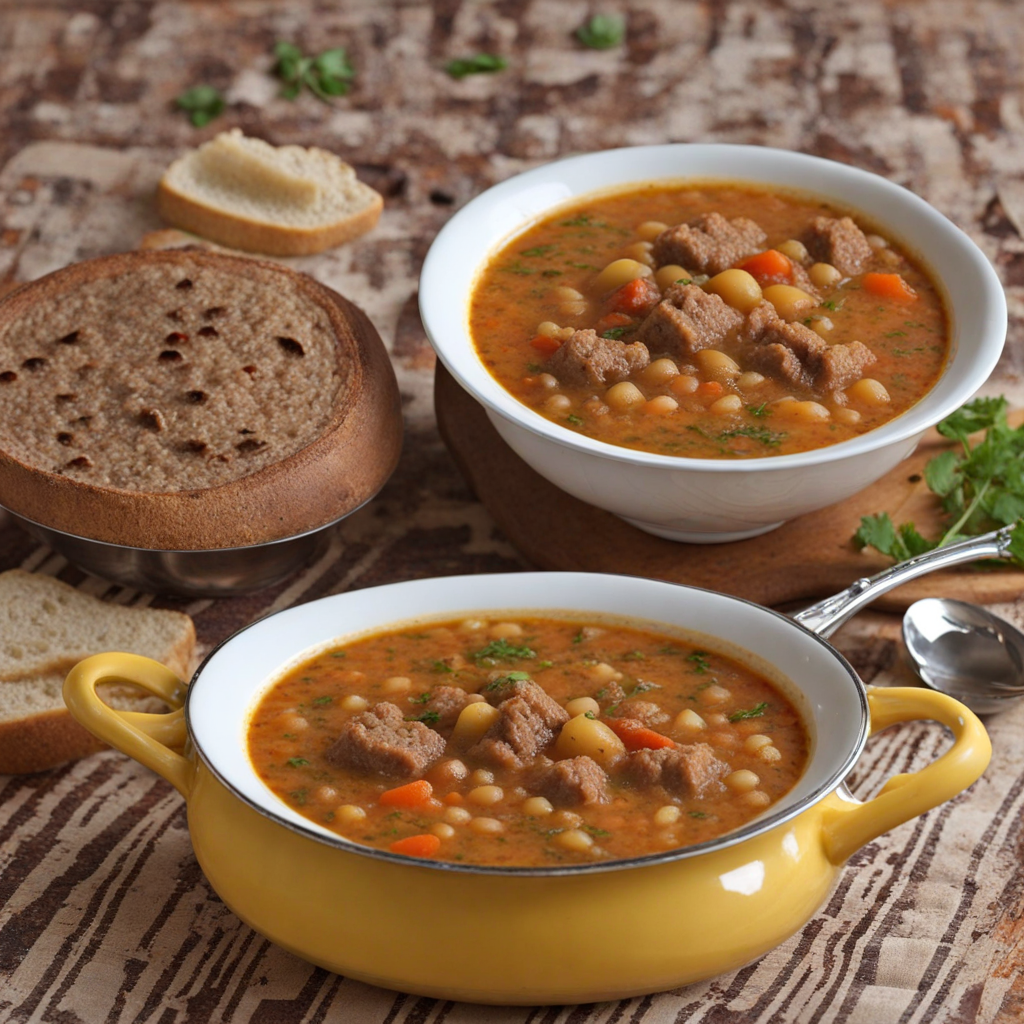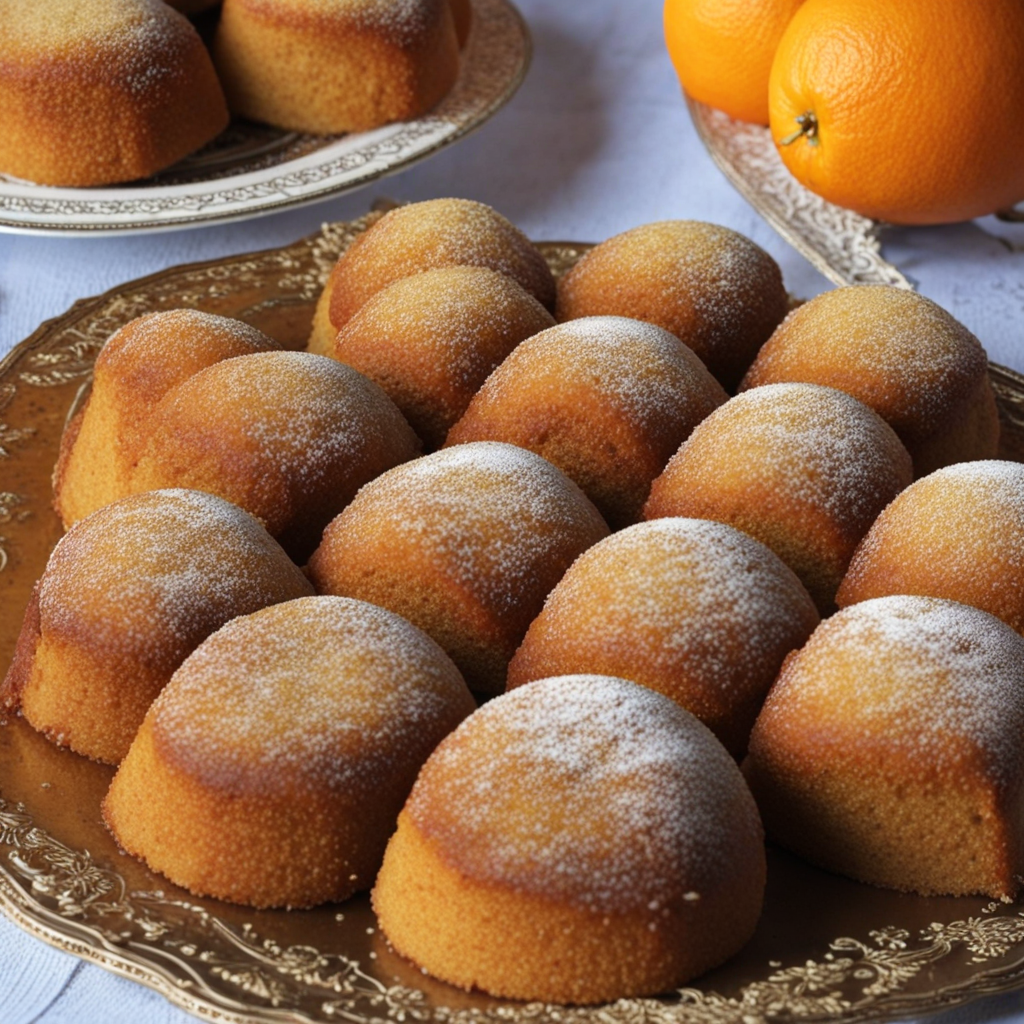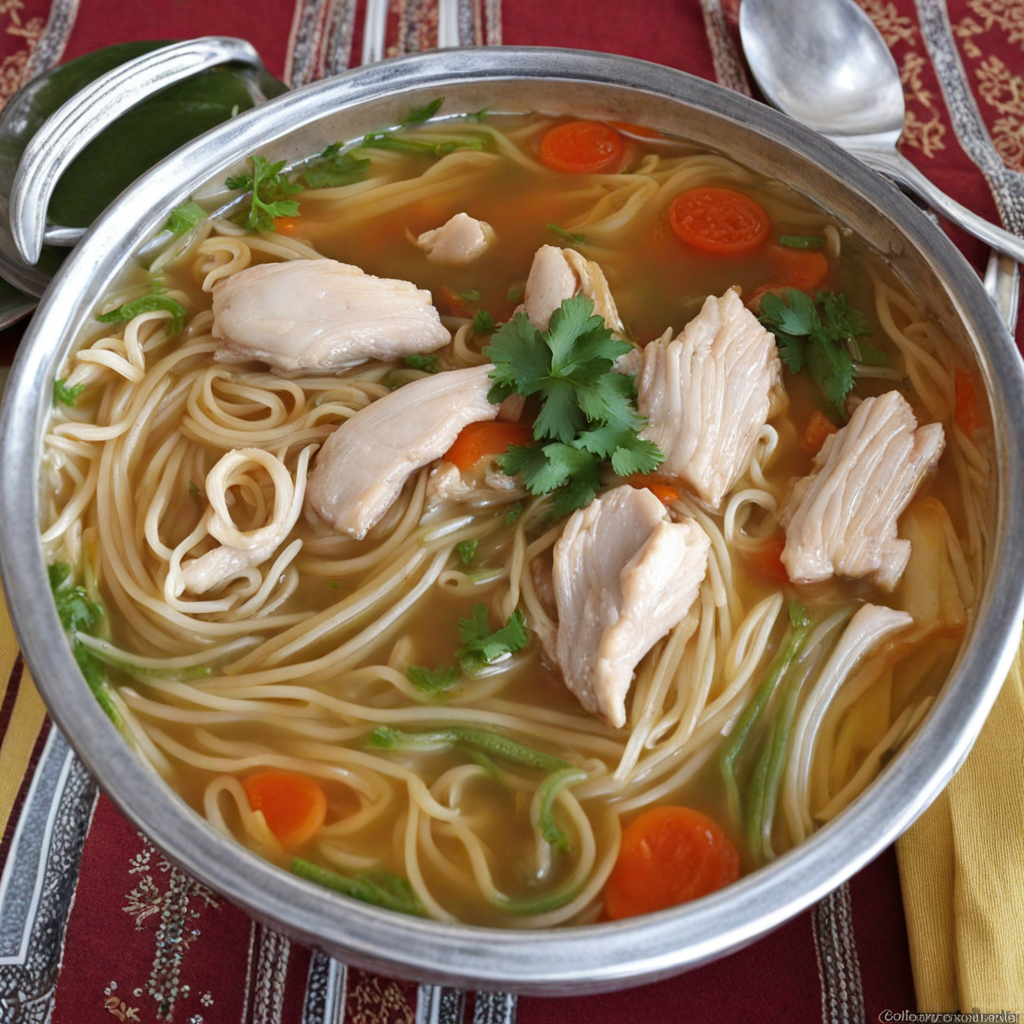Mechoui
Mechoui is a traditional Algerian dish that showcases the rich culinary heritage of North Africa, particularly in its use of whole lamb. The preparation involves slow-roasting the lamb, often over a wood fire or in a specially designed oven, which results in tender, juicy meat with a beautifully crispy exterior. The seasoning typically includes a blend of spices such as cumin, coriander, garlic, and sometimes a touch of chili, giving the meat a robust flavor that is both savory and aromatic. The lamb is usually marinated ahead of time, allowing the spices to penetrate the meat, making each bite a delightful explosion of taste.
How It Became This Dish
The History of 'المشوي' (Mashwi) in Algeria: A Culinary Journey Introduction to Mashwi The term 'المشوي' (pronounced 'mashwi') translates to 'grilled' or 'roasted' in Arabic, and in the context of Algerian cuisine, it refers to a variety of meats that are marinated and grilled over an open flame. This traditional dish is not only a staple in the culinary repertoire of Algeria but also a reflection of the country’s rich cultural heritage and historical influences. Origins and Early Influences The origins of mashwi can be traced back to the ancient Berber tribes of North Africa, who were among the first to inhabit what is now Algeria. The Berbers, known for their nomadic lifestyle, relied heavily on livestock for sustenance. They would roast meat over open fires, a practice that allowed them to preserve it in the arid climate. This method of cooking was not only practical but also imparted a distinct flavor that became a hallmark of their cuisine. With the arrival of Arab conquerors in the 7th century, the culinary practices in Algeria began to evolve. The Arabs introduced spices like cumin, coriander, and saffron, which would later find their way into the marinades used for mashwi. The melding of Berber and Arab culinary traditions laid the groundwork for what would become one of Algeria's most beloved dishes. Cultural Significance Mashwi is more than just a meal; it is a social and cultural event that embodies the spirit of community and hospitality in Algerian culture. Traditionally, it is served during family gatherings, weddings, and religious celebrations like Eid al-Adha, where lamb or goat is often the meat of choice. The act of grilling mashwi is often seen as a communal activity, bringing together family and friends around the fire. The communal aspect is further emphasized with the way mashwi is served. It is typically presented on a large platter, where diners gather to enjoy the food together, often using flatbread or hands to eat. This practice of sharing food symbolizes unity and reinforces social bonds, essential elements in Algerian culture. Development Over Time As Algeria underwent various historical changes, so too did the preparation and presentation of mashwi. The Ottoman Empire, which had a significant influence over Algeria from the 16th to the 19th century, introduced new cooking techniques and flavors. Grilling methods were refined, and the use of skewers became more prevalent, leading to the popularization of kebabs and shish-style preparations. In the modern era, particularly post-independence in 1962, mashwi has continued to evolve. Globalization and the influence of international cuisine have introduced new ingredients and cooking styles. While traditional methods remain popular, urban centers like Algiers have seen the rise of restaurants specializing in mashwi, offering variations that cater to diverse palates. The introduction of marinades with Western influences, such as barbecue sauces and spice mixes, has also added a new dimension to this traditional dish. Despite these modern twists, the essence of mashwi—its smoky flavor and communal experience—remains intact. Regional Variations Algeria is a country of diverse cultures and landscapes, and as such, mashwi exhibits regional variations. In the coastal areas, seafood mashwi has gained popularity, featuring grilled fish and shellfish, often seasoned with local herbs and spices. In the mountainous regions, mashwi may incorporate game meats, reflecting the local hunting traditions. One notable regional variation is 'mashwi bel khobz,' where grilled meat is served alongside traditional flatbreads, often infused with herbs. In urban centers, street vendors offer mashwi in various forms, from skewered meats to sandwiches wrapped in khobz, making it an accessible and beloved street food. Mashwi in Contemporary Cuisine In recent years, mashwi has found its way into the global culinary scene. As more people become interested in North African cuisine, dishes like mashwi are increasingly featured in international food festivals and culinary events. Chefs around the world are experimenting with mashwi, incorporating it into fusion dishes that blend traditional Algerian flavors with global culinary techniques. Social media platforms have also played a significant role in popularizing mashwi. Food bloggers and influencers share their takes on the dish, showcasing its vibrant colors and enticing presentation. This exposure has sparked interest in Algerian cuisine, encouraging both locals and expatriates to reconnect with their culinary roots. Conclusion Mashwi is a dish steeped in history and cultural significance, embodying the traditions of the Berber and Arab peoples of Algeria. Its evolution over time reflects the diverse influences that have shaped Algerian cuisine while maintaining its core values of community and togetherness. As Algeria continues to navigate the complexities of modernity, mashwi remains a cherished symbol of its rich culinary heritage—a delicious reminder of the past and a vibrant part of the present and future. Whether enjoyed at a family gathering, a festive occasion, or as a street food delicacy, mashwi is more than just grilled meat; it is a celebration of Algerian identity, resilience, and the timeless joy of sharing food with loved ones.
You may like
Discover local flavors from Algeria


